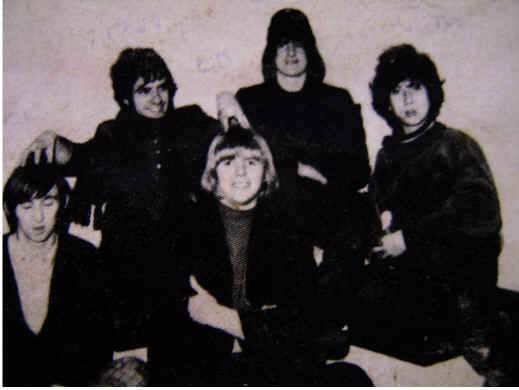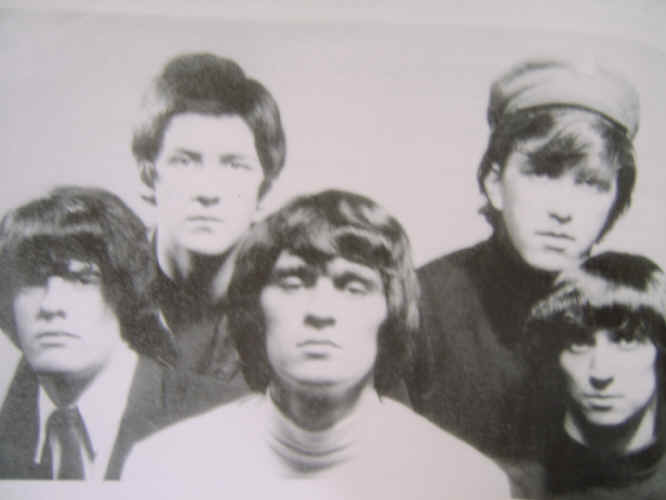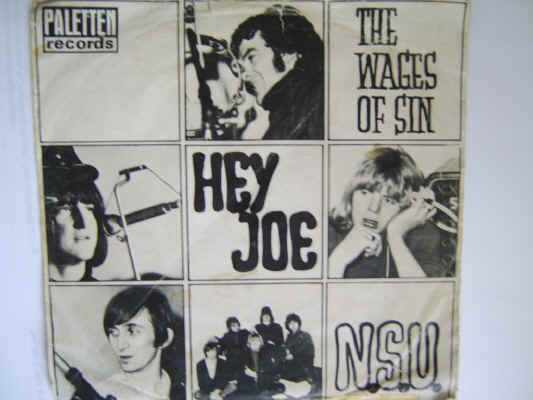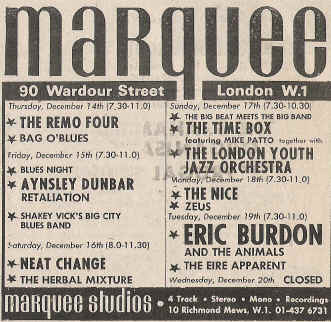


Ed
Pilling (vocals)
Brian
Pilling (guitar, vocals)
Mick
Hopkins (guitar, vocals)
Tony
Clarkson (bass, vocals)
Jimmy
Skidmore (drums)
(1966)
December English-born, Canadian raised brothers, singer Ed Pilling (b. 13 January 1948, Kingstanding, Birmingham, England) and guitarist Brian Pilling (b. 26 December 1949, Kingstanding, Birmingham, England) return to their place of birth to form a rock group. Having first emigrated in 1957, the Pillings have moved back and forth between Birmingham and Toronto several times as the family finds it hard to settle. Eldest brother, Ed Pilling, who returns to Kingstanding, Birmingham on his own in 1964 and stays with an aunt, witnesses the exploding rock scene in the Midlands and decides to take up drums. Returing to Toronto in mid-1965, he spends a year playing in high school band, The Pretty Ones with brother Brian Pilling and bass player Greg Godovitz. Determined to make it in their country of birth, the brothers return to England but Ed is forced to leave his drums behind due to the transportation costs.
Brian Pilling / Ed Pilling
Back in Birmingham, Ed Pilling reunites with an old school friend from Kingstanding, Ted Clarkson, whose older brother is rhythm guitarist Tony Clarkson (b. 15 July 1945, Kingstanding, Birmingham, England). Clarkson has been active on the local scene since 1962 when he started playing rhythm guitar with Guitars Incorporated (aka The GIs). The following year he joins The Wild Cherries, whose singer is the late Nicky James. After playing in several local groups, Clarkson joins Jamesís new group, The Nicky James Movement in January 1965 where he meets former Diplomats guitarist Mick ďSprikeĒ Hopkins (b. 3 January 1946, Great Barr, Birmingham, England). Hopkinsís first notable group is Gerry Levene & The Avengers, which features future Move guitarist Roy Wood and future Moody Blues drummer Graeme Edge, and is signed to Decca Records. While Hopkins is a member, the group records enough material for an album (but it is never released) although Decca does issue a lone single, Dr Feelgood, backed by Itís Driving Me Wild (featuring only Levene). In May 1964, however, Hopkins replaces Denny Laine in his group, The Diplomats when Laine forms The Moody Blues and records some demos. As members of The Nicky James Movement, Clarkson and Hopkins appear on a lone single for Columbia Records Ė Stagger Lee backed by Iím Hurtiní Inside, released in November 1965. Clarkson leaves to play bass guitar in several local bands but reunites with Hopkins two months later when the pair form a new group, The Way of Life with brothers, singer Reg Jones and guitarist Chris Jones, former members of The Chucks. Another Nicky James Movement member, future Led Zeppelin drummer John Bonham completes the line up. The Way of Life become a popular live attraction in Birmingham but Clarkson soon loses interest and leaves in July 1966 to work with Roger Hill in The Hooties, which later morphes into Exception. Around November Ted Clarkson brings the Pilling brothers round to the family home and, impressed by their charisma and musical abilities, Clarkson agrees to form a new band with them called The Wages of Sin.

The Nicky James Movement from late 1965. Tony Clarkson (bottom left) and Mick Hopkins (bottom right). John Bonham (top left)
(1967)
January Clarkson recommends his former The Way of Life cohort Mick Hopkins as a lead guitarist. When Ed Pilling is unable to get hire purchase to buy a drum kit and decides to concentrate on lead vocals, Clarkson and Hopkins try and entice John Bonham to join the fledging group but he prefers to stay with The Way of Life and will subsequently join Robert Plant in The Band of Joy in 1967. Clarkson contacts drummer Jimmy Skidmore, who has been playing in local group, The Delmore Lee Sound with keyboard player Norman Haines. Skidmore agrees to join on drums when Haines leaves to take up an offer with Locomotive, whose line up, at one point, includes future Traffic member, Chris Wood.
February The Wages of Sin sign to John Singerís Agency and he lines the band up with a monthís worth of work in Germany, playing at the Palleten club in Fulda, which is near an American army base. While there, the group records for the local Palleten label and cuts a version of Hey Joe (recently made famous by The Jimi Hendrix Experience) backed by a cover of Creamís N.S.U. The single becomes a rare collectorís item and is only released in Germany.

Download mp3 of NSU by Wages Of Sin: CLICK HERE
Download mp3 of Hey Joe by Wages Of Sin: CLICK HERE
March Back in the West Midlands at the start of the month, The Wages of Sin begin to work around the local area, appearing regularly at top venues like the Morgue, the Carlton Club (aka Carlton Ballroom) and the Cedar Club.
(13)
The group appears at the Hereford Lounge in the Bullís Head in Yardley.
(16)
The Wages of Sin perform at the Station Inn in Selly Oak.
(21)
They play at the Carlton Club, Erdington.
(24)
The band makes an appearance at the Selly Park Tavern in Selly Park.
(27-28) The Wages of Sin play two nights at the Hereford Lounge in the Bullís Head, Yardley.
April
(1) They open for London band, The Neat Change at the Carlton Club, Erdington.
(3)
The Wages of Sin play at the Hereford Lounge in the Bullís Head, Yardley.
(6)
The group appears at the Station Inn, Selly Oak.
(11)
They open for The Montanas at the Cedar Club, Birmingham.
(17)
The Wages of Sin open for Lulu at the Cedar Club.
May
(1) The
Wages of Sin appear at the Bullís Head in Hay Mills.
(4)
The
band plays at Station Inn in Selly Oak.
(12)
The
Wages of Sin perform at the Hereford Lounge at the Bullís Head in Yardley.
(15)
The
group makes an appearance at the Holly Bush pub in Quinton. The same night
singer/songwriter Cat Stevens performs at Birminghamís Cedar Club and this may
be the evening that he first hears about the group with whom he works with later
in the year.
(24)
The
Wages of Sin play at the Hen and Chickens in Yardley with The Uglyís.
(25) The next night, the band plays at the Station Inn in Selly Oak.
June
(3) They
return for another show at the Station Inn in Selly Oak.
(5) The Wages of Sin perform at the Holly Bush pub in Quinton. Soon afterwards, The Wages of Sin return to Germany to play a second residency at the Palleten club in Fulda. The group begins to introduce more psychedelic material, including a cover of The Beatlesí Lucy In The Sky With Diamonds.
Tony Clarkson / Mick Hopkins
July
(1) The
band returns to the West Midlands and plays at the Station Inn in Selly Oak.
(5)
The
Wages of Sin appear at the Mackdown in Kitts Green with The Modernaires.
(7)
They
perform at the Hereford Lounge in the Bullís Head, Yardley.
(10)
The
group appears at the Holly Bush pub in Quinton.
(17)
The Wages of Sin perform at the Regent Club in Langley Green with The Uglyís
and The Stax Movement.
(19)
The
musicians appear at the Hen and Chickens in Langley Green with The Wellington
Kitch Jump Band.
(21)
The
Wages of Sin perform at Gotham City in the Crown and Cushion in Perry Barr with
The Second Thoughts.
(22)
The
band appears at the Elbow Room in Aston.
(28) The group plays at the Bullís Head in Yardley. Aware of the more progressive musical scene emerging and to avoid confusion with another group called The Wages of Sin, they change their name Yellow Rainbow, which inspires Hopkinsís former Gerry Levene & The Avengers band mate, Roy Wood to write a song for The Move using the same title.
August
(7) Yellow
Rainbow play at the Holly Bush pub in Quinton.
(12)
They
appear at the Queenís Beat Club in Erdington.
(14)
The
band plays at the Regent Club in Langley Green with The Montanas.
(18)
Yellow
Rainbow appear at the Penthouse in Birmingham with Strictly for The Birds.
(26)
Billed
as The Wages of Sin, they play at the Co-Op in the Rainbow Suite, Birmingham with The Age.
(28)
Billed
once again as Yellow Rainbow, they appear at the Boorís Head in Perry Barr.
(30) Yellow Rainbow perform at the Hen and Chickens in Langley Green.
September
(4) The
band appears at the Holly Bush in Quinton.
(14)
Yellow
Rainbow make an appearance at the Queenís Beat Club in Erdington.
(16)
The
group plays at the Station Inn in Selly Oak.
(25)
Yellow
Rainbow appear at the Boorís Head in Birmingham.
(30) They play at the Bullís Head in Yardley.
October
(2) Yellow Rainbow play at the Holly Bush pub in Quinton. This may be the
evening that Cat Stevensís brother and manager David Gordon approaches the
musicians and invites them to London to record and work as Cat Stevensís
backing band. Despite having a yearís worth of bookings in Birmingham, the
group accepts and is put on a retainer. Before moving to London, Yellow Rainbow
fufill a number of local bookings.
(7)
They
appear at the Swan in Yardley Green with Chances Avenue.
(8) One of the bandís final gigs in the West Midlands is at the Crown and Cushion in Perry Barr. Soon afterwards, Yellow Rainbow relocate to London where Cat Stevens renames them, Zeus.

November
(10) Zeus
plays a solo set at Middle Earth with The Soft Machine and Sensory Armada. They
spend the next few days rehearsing at the Marquee with Stevens in preparation
for a forthcoming show in France.
(17-18) Backing Cat Stevens, Zeus performs at the Palais de Sports in Paris on a show that also features The Spencer Davis Group, The Soft Machine, Dantalionís Chariot, Keith West and Tomorrow. The show is recorded and broadcast on French TV.
December
Back
in the UK, Stevens records and produces Zeus covering two of his compositions at
Pye Studios, which are subsequently shelved.
(18) Zeus appears at the Marquee in London, opening for The Nice.
(1968)
January (20) Cat Stevens and Zeus appear at the Winter Gardens Weston-Super-Mare. Within weeks, Stevens contracts TB and is forced to lay low while he recuperates. Although the band is on a retainer, there is little work and in February the Pilling brothers decide to return to Toronto where they will subsequently form Fludd with former Pretty Ones bass player Greg Godovitz. Fludd record their debut album for Warner Brothers in August 1971 and will have several notable Canadian hits in the early 1970s, including Turned 21. The Pilling brothersí departure scuppers the band. Skidmore subsequently joins The Norman Haines Band while Clarkson responds to an advert in NME and becomes a member of The World of Oz, whose debut single is released on 14 August 1968. The band records three popsike singles for Deram between 1968-1969, including the catchy The Muffin Man and an eponymous lone album. A fourth single appears in Holland where The World of Oz is a popular attraction. When the group breaks up, Clarkson briefly becomes a roadie for The Moody Blues, working part of their 1971 world tour. Hopkins, meanwhile, joins Birmingham group, The Lemon Tree in June 1968 and appears on their second Parlophone single " Itís So Nice To Come Home", which is produced by Andy Fairweather-Low. He then forms Copperfield who record two singles in 1969-1970. The first, Any Old Time, is for the Instant label and is produced by Andrew Loog Oldham, while the second, Iíll Hold Out My Hand, is for Parlophone. Kenny Jones of The Small Faces plays drums on Any Old Time. In January 1971, Hopkins replaces Jeff Lynne in The Idle Race and appears on the groupís final single for Regal Zonophone, Dancing Flower, and a lone album, Time Is.
(1971)
December Hopkins answers a call from the Pilling brothers to fly to Toronto and join Fludd. He appears on one single, Get Up, Get Out and Move On, which reaches #34 on the Canadian charts, before returning home to Birmingham after six months to put together Barefoot, resident band at the Rum Runner in Birmingham. Hopkins later finds a degree of fame with heavy rock band, Quartz. Hopkins currently records in his own studio in Bimingham with friends from his 1960s group, Copperfield. Fludd, meanwhile, enjoyed further Canadian hits with Cousin Mary and What An Animal among others before Brian Pilling succumbs to cancer on 28 June 1978, aged just 29. The group later evolves into Saga. Ed appears with a new version of Fludd in Toronto on 30 April 2009 with Foot In Cold Water.
My
personal thanks go to Ed Pilling, Mick Hopkins and Tony Clarkson for helping
to pull the story together. Thanks also to Mick Capewell at Marmalade Skies.
The live dates were taken from Melody Maker and The Birmingham Evening Mail.
Thank you also to Vernon Joynson and his excellent book, The Tapestry of
Delights and Laurie Hornsbyís Brum Rocked On!
PLEASE
NOTE: I have tried to ensure this article is as accurate as possible but I
would be grateful if anyone who can provide more information about this band
could contact me at the email below.
Copyright
© Nick Warburton, 2009, All Rights Reserved. No
part of this article may be reproduced or transmitted in any from or by any
means, without prior permission from the author.
To
contact the author, email: Warchive@aol.com
Visit: www.nickwarburton.com